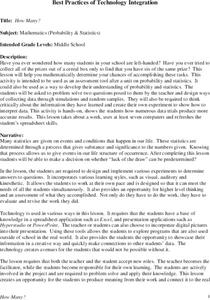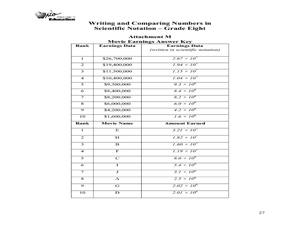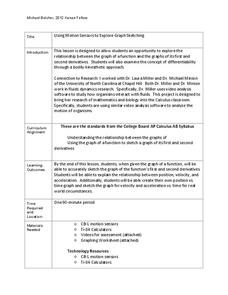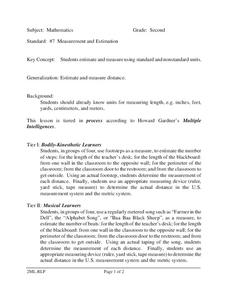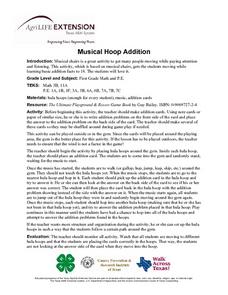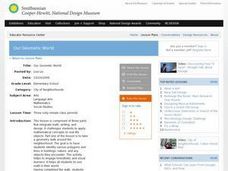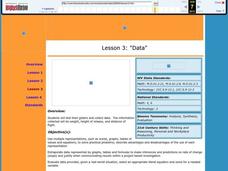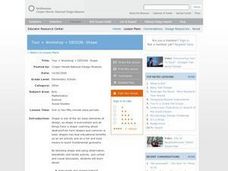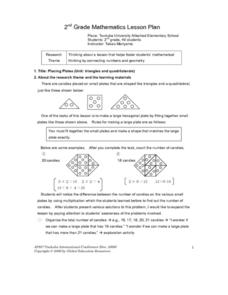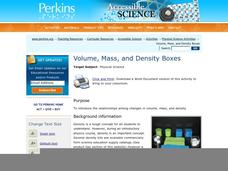Curated OER
How Many?
Middle schoolers explore and design ways to collect data through simulations and random samples. They perform two experiments to determine the answers to various probability problems, and present the data/graphs in the form of a...
Ohio Department of Education
Writing and Comparing Numbers in Scientific Notation-Grade Eight
Explore scientific notation in this mathematics lesson plan. Young mathematicians explore multiple representations of large number in scientific notation through the use of models, visual representation and expanded form. The lesson plan...
Curated OER
Dot Plots
Number crunching statisticians explore displaying data with dot plots and define the difference between quantitative data and qualitative data. Dot plots are created based on a set of given data and analyzed.
Kenan Fellows
Using Motion Sensors to Explore Graph Sketching
Get moving to a better understanding of graphs of derivatives. Using motion sensors, scholars vary their velocities to create graphs of the first derivative of a function. The activity challenges groups to first create a script of the...
Curated OER
Introducing Ideas about Inheritance
Is it nature or nurture? In an easily adaptable kinesthetic activity to introduce genetics, learners group themselves based on a variety of categories. They will quickly find that some characteristics are easy to put in order, while...
Curated OER
Measurement and Estimation
Second graders explore estimation and measurement. In this estimation and measurement instructional activity, 2nd graders use footsteps to measure distances around the classroom. Students sing songs to measure the number of beats from...
Curated OER
#3 Differential Calculus
Learners create models of the Mean Value Theorem. In this Mean Value lesson plan, students use their knowledge of derivatives and exponential functions to explore the Mean Value Theorem. They illustrate the meaning of the throrem,...
Curated OER
Using Manipulatives to Teach Fractions
There is no doubt that learners remember what they have learned when they have a visual representation. Using an egg carton and candy bars, they explore the concept of fractional amounts. By having pupils cut the egg carton into parts...
Curated OER
Musical Hoop Addition
Musical chairs is a great activity to get children moving while still paying attention and listening. This activity, which is based on musical chairs, gets students moving while learning basic addition facts. They hop from hoop to hoop...
Curated OER
Our Geometic World
Pupils walk around the neighborhood and identify various polygons and lines in buildings, nature and other objects. They design a building using various geometric patterns, shapes and lines. Students complete a descriptive writing of...
Curated OER
What's Shaking? Three-Lesson Unit
Your young architects use the Internet to research tall structures or sky scrapers to help in the design of their scale drawings. This is lesson one of three in which learners design, build, and test model skyscrapers for seismic safety....
Curated OER
Data
Students collect data from an experiment they perform. In this data lesson, students use multiple representations to solve practical problems; describe advantages and disadvantages of the use of each representation. Then, they evaluate...
Curated OER
Let's Count to 20
Budding mathematicians create groups of 10 to 20 objects using numerals to record the size of a group. They construct sets of numbers up to 10, write the numerals up to 10, and count up to 10 rationally. Students also use ten frames and...
Curated OER
Fraction and Decimal Ordering
Ordering numbers just got physical! Learners practice putting numbers in sequence, both in fraction and decimal form. To begin, they line up in birthday order and discuss the difference between ascending and descending. They are then...
Curated OER
Tour + Workshop = DESIGN: Shape
Ask elementary students to explore shapes in everyday objects. They will discuss the elements of design and describe the shapes they see in visual images. Students will then design and "build" a new 3D shape. Finally they will show and...
Curated OER
Modeling Integer Multiplication
Pupils multiply positive and negative integers. They represent word expressions with both positive and negative integers and then multiply them. They also create multiplication problems to solve as a class. They create a rhyme, a story,...
Curated OER
Fractions
Students determine that a fraction is a part of a whole or part of a group. They write and read fractions and solve various fraction problems. They create their own fraction problem using colored candies for their classmate to solve.
Berkshire Museum
Where’s the Water?: Acting Out Science Cycles
Young scientists transform themselves into rivers, oceans, clouds, and drops of water in order to explore the water cycle. After assigning and explaining to students their different roles in the activity, the teacher reads aloud a...
Curated OER
Multiple Intelligences Holistic Plan
Ninth graders apply basic algebra concepts to equations using cognitive, affective, and kinesthetic components. They create their own word problem, perform the story problem using a dramatic presentation, and present the problem to the...
Curated OER
Dolphins And Penguins
Students participate in an activity that reinforces vertical addition sentences as well as provides facts about penguins. They assess a kinesthetic/visual activity to reinforce the difference between vertical and horizontal addition...
Curated OER
Technology Lesson Plan
Students measure various objects using non-standard units. The goal is for them to practice measuring in order to apply the physical act to various objects found in the classroom. The lesson is ideal for the kinesthetic learners and...
Curated OER
Counting on Coins
Learners count coins. In this currency and mathematics lesson, students use skip counting to figure the value of a group of coins. Learners use plastic replica coins and real coins.
Curated OER
Placing Plates
Second graders investigate the task of making a large hexagonal plate by putting together smaller ones. The lesson has detailed example problems for the teacher to use during direct instruction. The manipulative activities strengthen the...
Perkins School for the Blind
Volume, Mass, and Density Boxes
Mass and density are difficult topics for kids to understand, and even more difficult when you have visual impairments or blindness. Learners will make boxes and fill them with cotton, sand, or crushed paper. They will feel the density...
Other popular searches
- Kinesthetic Math Games
- Kinesthetic Math Activities
- Kinesthetic Math Fractions
- Kinesthetic Math Subtraction
- Kinesthetic Math Lessons
- Kinesthetic Math Plans
- Kinesthetic Math Quadratic
- Kinesthetic Learner Math Time
- Kinesthetic Math Money


